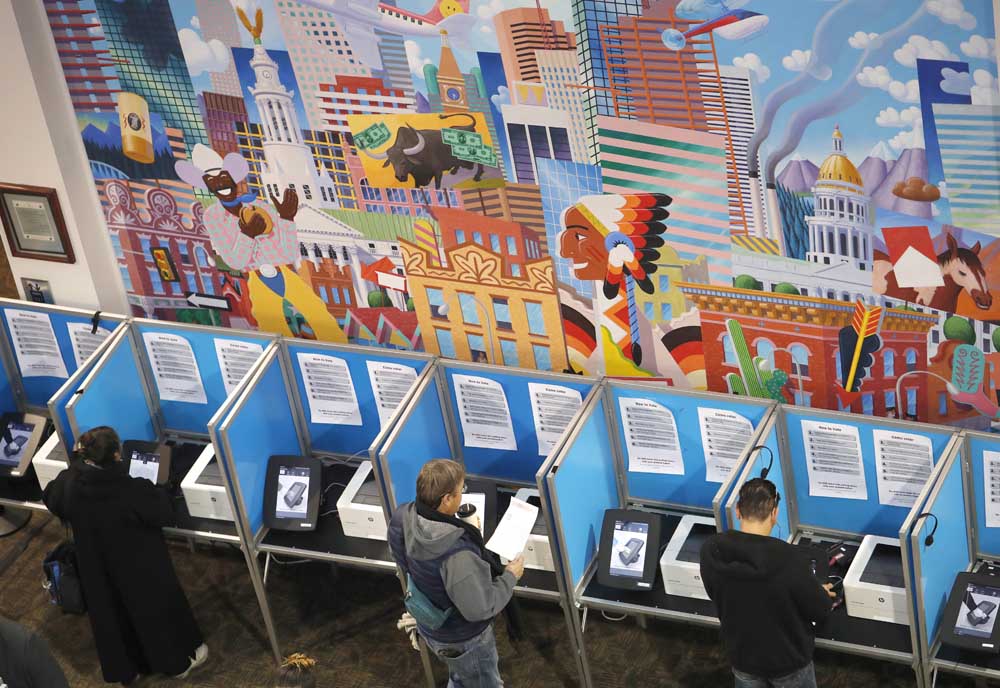Pro-Con: Should Congress make Electoral College more responsive to popular vote?
Published 8:00 am Friday, April 12, 2019

- Voters cast their ballots Nov. 6, 2018 in Denver. Colorado’s Democrat-controlled Legislature has approved a bill to join other states in casting their presidential electoral votes for the winner of the national popular vote.
PRO: Change or abolish Electoral College to ensure equal voice for all
By Don Kusler
WASHINGTON — The time has come to change or dismantle the Electoral College system of selecting the United States president.
This outdated result of a constitutional compromise sets up not only a system that can produce an imbalance between the popular vote and the final selection of the president, but can result in a dramatic disparity in governing power for a generation.
The original intent of the Electoral College was to get smaller states to ratify the Constitution in a time before the United States was anything remotely resembling the United States today: when only a small number of states existed, when only white men had the right to vote and before the popular vote was even recorded.
A goal of ensuring that smaller states have adequate representation is important. Majorities should not have unchecked ability to impose their will just as each branch of government — the judicial, legislative and executive — should be checked and held in balance by the other two.
The way that the legislative branch is set up already achieves the goal of balancing power among states of varying population, most notably through the United States Senate where each state has equal representation in the upper chamber. The House of Representatives, conversely, allocates representation based on population.
Another balancing effect is that the Senate also has enormous power in shaping not only legislation but shaping the judicial branch and in approving key executive branch administration leaders. This gives smaller states a healthy voice in shaping our government.
But when the Electoral College system produces a presidency without a majority of popular votes, this balance can become decidedly imbalanced.
Imagine a scenario where the executive branch is led by someone who did not receive a majority of the popular vote and the Senate is controlled by ideological allies of the executive branch representing states whose population is less than the population represented by those states in the Senate minority.
This scenario would produce a situation where enormous governing power is concentrated, through the executive branch and the Senate’s power in shaping the makeup of the judicial branch, in favor of the minority — not only for the term of the executive but perhaps for generations.
While many may believe, in the current political climate, that a move to alter or abolish the Electoral College only benefits or should matter to urban voters and residents of large populous states, quite the opposite is true.
Yes, the current political climate and recent electoral examples make the Electoral College system seem to favor Republicans or conservatives and more rural areas while enraging Democrats, progressives and urban voters. But it could foreseeably also swing in the other direction with the right mix of election results.
This could allow a small number of populous states to then concentrate power over a majority not only of other states but population and election results as well.
The current system also encourages presidential candidates to concentrate their campaigning and by extension their legislative and policy attention on a small number of states with larger numbers of electoral votes, which negatively impacts a wide range of regions and ideological groupings.
There are several efforts underway to correct this from the most direct, which is to amend the Constitution, to the more indirect like the National Popular Vote Interstate Compact, which is an agreement between states to award their Electoral College votes to the winner of the national popular vote notwithstanding the outcome in their individual states.
Regardless of whether you live in a small state or populous one, whether you are conservative or progressive, the outdated Electoral College system can create an imbalance of power that could negatively impact your life and needs to change.
Don Kusler is national director of Americans for Democratic Action, an organization committed to liberal politics and policies.
CON: Electoral College protects all Americans against ‘tyranny of the majority’
By Merrill Matthews
DALLAS — The Electoral College is one of the most critical institutions created by the framers of the Constitution to ensure a stable representative government, yet it’s under attack.
Eliminating or effectively neutering the Electoral College — the two options being proposed by many Democrats — would fundamentally alter the country, which, of course, is exactly what progressives are hoping to do. This would be grievously wrong.
Let’s start with the basics of our American system, which is, by design, unlike any other.
States, not individuals, are the original source of power. The states — 13 of them, anyway — created the federal government.
Less-populated states were understandably concerned they would be overshadowed by the larger ones, so they demanded protections within the Constitution. Giving every state, regardless of size, two senators was one of those protections. The Electoral College was another.
Both concessions were intended to protect the minority against what is sometimes referred to as the “tyranny of the majority,” the concern that in a pure democracy the majority can do whatever it wants, regardless of how badly it might harm the minority.
The framers did their best to create a representative political system that minimized the potential for a tyranny of the majority. They largely achieved their goal, though progressives have been successfully chipping away at those protections for decades.
Because the states created the federal government, the Constitution gives the states, not individuals, the right to choose the president. Thus the states decide how their electors are chosen and function.
The Electoral College is a feature, not a bug, because it helps ensure that every state matters.
For example, California, with 55 electoral votes, has more people than the 21 smallest states combined. Yet those 21 states have a combined total of 92 electoral votes — more than a third of the total votes needed to win.
Under a majority-wins election, candidates would spend most of their time in and catering to the most-populated states and largest cities, rather than traveling to thinly populated rural areas.
But doesn’t the Electoral College distort the popular will? No, not really.
The Electoral College vote has generally reflected the popular vote. Since 1900 there have only been two presidential elections, 2000 and 2016, in which the loser had slightly more votes than the winner.
Democrats lost in both instances, which is why they want to change the system.
They want presidential elections based on the popular vote, but that sometimes isn’t the majority. Several presidential candidates won with a plurality of votes rather than a majority, including John F. Kennedy, Richard Nixon and Bill Clinton — twice.
It was the Electoral College vote that legitimized their victories, even though they didn’t win a majority of votes.
Fortunately, only a constitutional amendment can change the Electoral College. And the framers made that process very difficult, again in an effort to limit the majority’s ability to ride roughshod over the minority.
So Democrats are pushing a workaround known as the National Popular Vote Compact. NPVC legislation requires a state’s electors to vote for whoever wins the national popular vote.
According to the National Conference of State Legislators, 13 states plus the District of Columbia — all of which currently are blue — with a total of 184 electoral votes, have passed NPVC legislation.
However, it doesn’t go into effect until states representing the 270 electoral votes needed to win a presidential election have joined the NPVC.
As for me, if my state of Texas votes overwhelmingly for a particular candidate, I want my state’s electors supporting that candidate, not someone who won in another state.
For more than 200 years the Constitution and the government it created have served as a model for stability and representative government. Do we really want to undermine that success story just so Democrats can win a presidential election?
Merrill Matthews is a resident scholar with the Institute of Policy Innovation, a research-based public policy think-tank.






